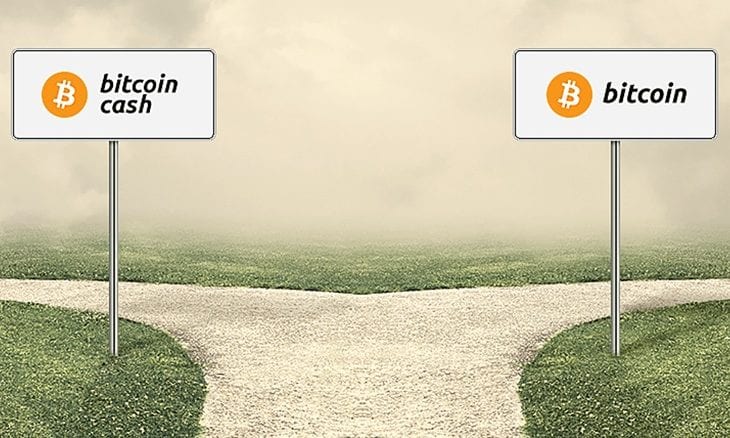Differenec between Bitcoin and Bitcoin Cash
The problem with this technology is that it’s slow. Like, really slow, especially in comparison to banks that deal with credit card transactions. Visa processes 150 million transactions per day, averaging out to roughly 1,700 transactions per second. And their capability far surpasses that, at 24,000 transactions per second.
How many transactions can the Bitcoin network process per second? Seven. Transactions take about 10 minutes to process. And as the network of Bitcoin users grows, waiting times will get longer, because there are more transactions to process without a change in the underlying technology that processes them.
In mid July 2017, mining pools and companies representing roughly 80-90% of Bitcoin computing power voted to incorporate a technology known as a segregated witness, called SegWit2x. SegWit2x makes the amount of data that needs to be verified in each block smaller, by removing signature data from the block of data that needs to be processed in each transaction, and having it attached in an extended block. Signature data has been estimated to account for up to 65% of data processed in each block, so this is not an insignificant technological shift. Talk of doubling the size of blocks from 1mb to 2mb in November has ramped up, and is expected.fThis would also go some ways in improving Bitcoin’s scalability. In mid-October, Bitcoin scientists from Bitcoin Unlimited revealed they had mined the world's first 1GB block, 1,000 times bigger than the normal size.
Bitcoin Cash is a different story. Bitcoin Cash was started by Bitcoin miners and developers equally concerned with the future of the cryptocurrency, and its ability to scale effectively. These individuals had their reservations about the adoption of a segregated witness technology, though. They felt as though SegWit2x did not address the fundamental problem of scalability in a meaningful way, nor did it follow the roadmap initially outlined by Satoshi Nakamoto, the anonymous party that first proposed the blockchain technology behind cryptocurrency. Furthermore, the process of introducing SegWit2x as the road forward was anything but transparent, and there were concerns that its introduction undermined the decentralization and democratization of the currency.
On August 1st, some miners and developers initiated what is known as a hard fork, effectively creating a new currency: Bitcoin Cash. Bitcoin Cash has implemented an increased block size of 8mb, to accelerate the verification process, with an adjustable level of difficulty to ensure the chain’s survival and transaction verification speed, regardless of the number of miners supporting it. This has raised concerns about the security of Bitcoin Cash.
How many transactions can the Bitcoin network process per second? Seven. Transactions take about 10 minutes to process. And as the network of Bitcoin users grows, waiting times will get longer, because there are more transactions to process without a change in the underlying technology that processes them.
In mid July 2017, mining pools and companies representing roughly 80-90% of Bitcoin computing power voted to incorporate a technology known as a segregated witness, called SegWit2x. SegWit2x makes the amount of data that needs to be verified in each block smaller, by removing signature data from the block of data that needs to be processed in each transaction, and having it attached in an extended block. Signature data has been estimated to account for up to 65% of data processed in each block, so this is not an insignificant technological shift. Talk of doubling the size of blocks from 1mb to 2mb in November has ramped up, and is expected.fThis would also go some ways in improving Bitcoin’s scalability. In mid-October, Bitcoin scientists from Bitcoin Unlimited revealed they had mined the world's first 1GB block, 1,000 times bigger than the normal size.
Bitcoin Cash is a different story. Bitcoin Cash was started by Bitcoin miners and developers equally concerned with the future of the cryptocurrency, and its ability to scale effectively. These individuals had their reservations about the adoption of a segregated witness technology, though. They felt as though SegWit2x did not address the fundamental problem of scalability in a meaningful way, nor did it follow the roadmap initially outlined by Satoshi Nakamoto, the anonymous party that first proposed the blockchain technology behind cryptocurrency. Furthermore, the process of introducing SegWit2x as the road forward was anything but transparent, and there were concerns that its introduction undermined the decentralization and democratization of the currency.
On August 1st, some miners and developers initiated what is known as a hard fork, effectively creating a new currency: Bitcoin Cash. Bitcoin Cash has implemented an increased block size of 8mb, to accelerate the verification process, with an adjustable level of difficulty to ensure the chain’s survival and transaction verification speed, regardless of the number of miners supporting it. This has raised concerns about the security of Bitcoin Cash.
Differenec between Bitcoin and Bitcoin Cash
![Differenec between Bitcoin and Bitcoin Cash]() Reviewed by saiyadnauman
on
10:03:00
Rating:
Reviewed by saiyadnauman
on
10:03:00
Rating:




No comments: